Proof That It’s a Pre-Code Film
- Pre-marital sex.
One Man’s Journey: Never Ending Story
“I can’t prevent God, making life and death go on… All I can do is to make it a little easier for people to take the blows.”
One Man’s Journey is a quiet tale, one so simple and sweet that it could easily lull you to sleep. A brilliant doctor ends up back in his dusty hometown after the death of his wife, raising his son on his own. He acquires Sarah, a wry housekeeper, and a surrogate daughter, Letty, through his travails. Because of a patient’s death early in his tenure, he becomes to the go-to doctor for the poor farmers in the area. This means that Dr. Watt works for years off of potatoes and gruff hugs, but he does his job and he does it well.
There’s real emotion that you could find in the way a man lives his life, and the gentleness of One Man’s Journey alludes to that. It’s a hardnosed, determined existence not out of choice but coming from passion and determination. Watt asks for nothing more and follows his heart. That takes care of him.
Spoilers.
The moral of the film is fairly tidy: there’s more honor in helping those that no one else will help and in sticking with it than in all of the praise, riches and glory you could earn otherwise. It’s a peon to humility and kindness. But real life ain’t like that. A week after everyone toasts Watt’s hard work, they’ll be back at their schmoozing. The famous research doctors will be remembered for decades to come, while the poor get their history erased. All those lives saved become forgotten in the endless tragedy of the mundane. I’m not trying to be a downer here, just practical– for all the film’s lauds that it flings Watt’s way, it makes him out to be the noblest of the noble and the purest of the pure. His happiness and comfort is what he made out of it.
And, look, I understand that the movie is a fable, but compare it to So Big!, which similarly covers a person’s life of living on other people’s terms and eventual success. The conflict here is completely flaccid– compare McCrea’s boastful realization about his dad’s commitment to work versus Hardie Albright’s sudden realization that he’d gotten everything wrong, and it’s easy to see how One Man’s Journey lacks that gut punch. One Man’s Journey is so quietly sure that there’s no reason to ever doubt its central message, meaning that the dramatic fireworks are always met with cold water.
End spoilers.
The biggest reason to recommend One Man’s Journey is Lionel Barrymore’s performance– he only gets one speech and he smartly underplays it. It’s a quietly non-showy showy role covering several decades and showing how life wears at a man. Joel McCrea seems wasted but fine and the same goes for Frances Dee. May Robson gets to play a cranky old woman with enough push and charm to get by. David Landau, one of the great gruff character actors of the time, does some wonderful work as the man whose life runs parallel to Watt’s, but it lacks the luck and grace of the man he’d hate and eventually become friends with.
Dorothy Jordan isn’t much good– her character should be the focal point for much of the drama (and is, indeed, the most foreplay focused of the bunch) but there’s something tinny to it. She just doesn’t have the chops to maneuver between being spurned and being a mother, and part of the reason the movie seems to lack much of a conflict comes from her and her character.
All that being said, One Man’s Journey isn’t bad, just disposable. For people who love the idea of a certain ethos to their being and a purity of vision, that belief that hard work and sacrifice are virtues into themselves and should be central to any life, I can imagine that the movie may move them. I’m a bit more pragmatic and undoubtedly more cynical that the movie ever gives me credit for.
Gallery
Click to enlarge. All of my images are taken by me at full screen size– please feel free to reuse with due credit!
Trivia & Links
- Remade in 1938 as A Man to Remember with Edward Ellis and Anne Shirley.
- Some reviews and background on this one from TCMDB:
Working in uncharacteristic understatement as Watt, Lionel Barrymore creates a warmly sympathetic portrait of a man who does good simply because it never occurs to him to do anything else. Mordaunt Hall wrote in The New York Times, “Mr. Barrymore lends amazing sincerity to his role…He is never too fatigued to attend to the ills of those who are unable to pay for medical attention. He is always even-tempered, in fact a lovable character.” Time magazine’s reviewer considered that Barrymore acted “so shrewdly that Katharine Havilland-Taylor’s lachrymose little story has moments of validity.”
Director John S. Robertson had enjoyed his greatest success with the 1920 Dr. Jekyll and Mr. Hyde, starring another Barrymore – John. In One Man’s Journey he handles his entire cast sensitively. It’s difficult to imagine a more appealing young couple than McCrea and Dee as they appear here. The two were married on October 20, 1933, a month after the film’s release. They remained a couple until McCrea’s death in 1990.
Awards, Accolades & Availability
- This film is one of six that was given to producer Merian C. Cooper after a dispute with RKO. That means that his estate, not RKO, held the rights to it until TCM picked them up. They released them on DVD a few years back including One Man’s Journey, but sadly it appears they are now out of print. This one still pops up on TCM now and again.
More Pre-Code to Explore




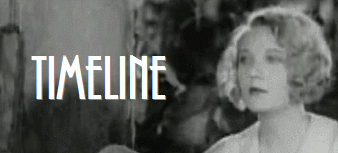


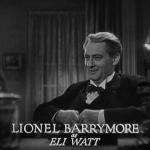
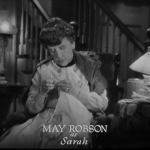
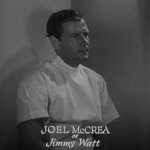
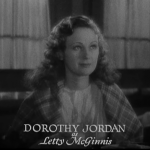
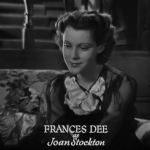
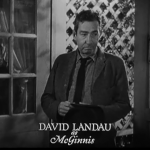
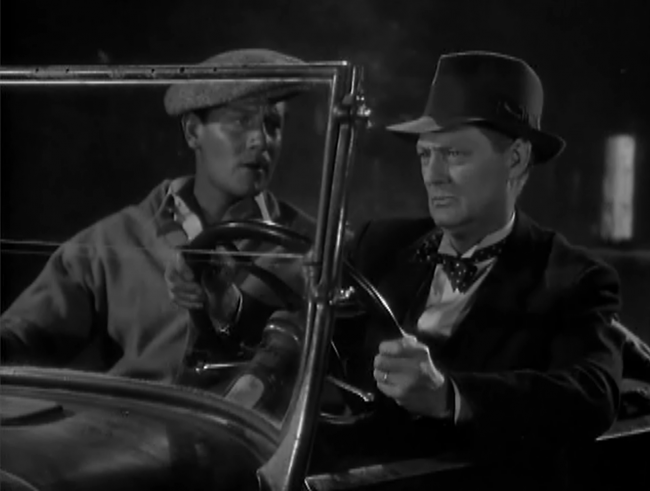
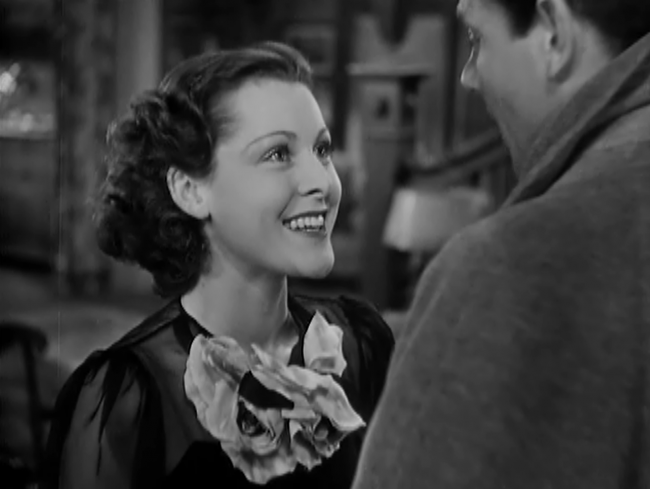
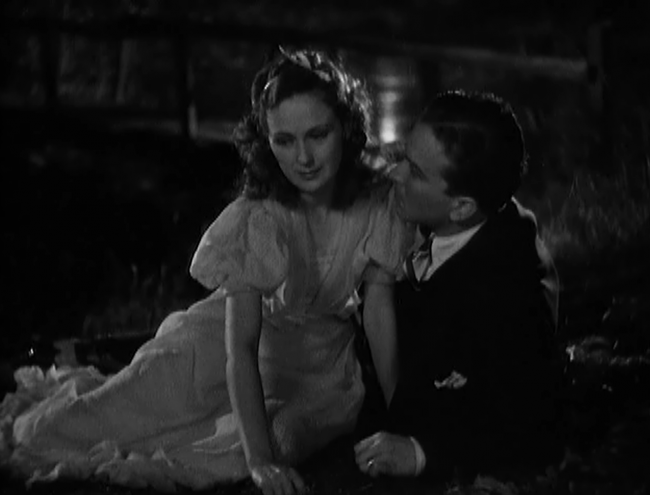
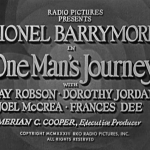
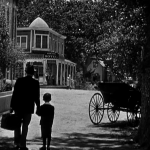
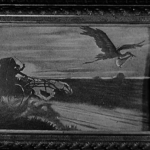
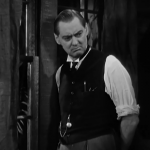
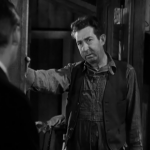
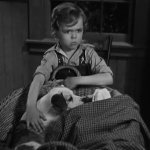
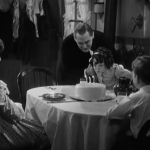
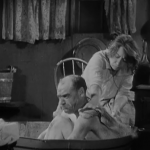
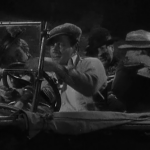

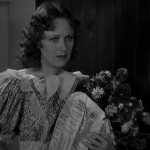
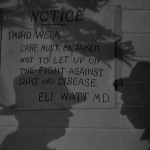
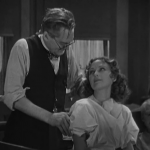
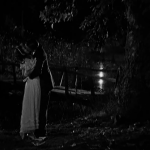
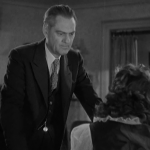
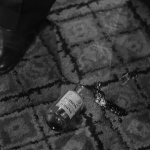

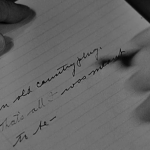
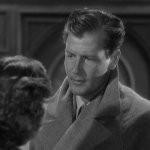
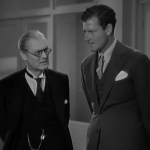
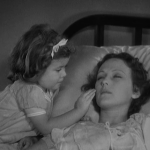

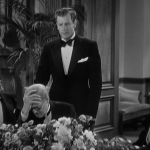
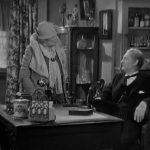
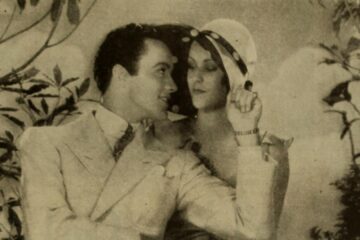


1 Comment
Camille · May 27, 2016 at 1:31 am
Sorry to be one of those tiresome grammar people, but I think you may have used “peon” where you meant “paean.”
Comments are closed.